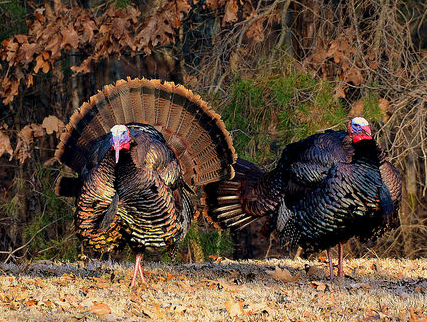 The former Wright property, located just west of Cecilton, Maryland, was acquired by the Department of Natural Resources in March 2008. The 988-acre tract is dedicated to wildlife conservation.
The former Wright property, located just west of Cecilton, Maryland, was acquired by the Department of Natural Resources in March 2008. The 988-acre tract is dedicated to wildlife conservation.
Click Here for Map
Management
Grove Farm WMA is managed by the Wildlife and Heritage Service. The mission of the Wildlife and Heritage Service is to conserve and enhance diverse wildlife populations and associated habitats while providing for public enjoyment of the State’s wildlife resources through hunting and other wildlife-dependent recreation. Grove Farm WMA provides habitat for migratory waterfowl and upland and forest wildlife species including white-tailed deer, wild turkeys, squirrels, rabbits, and songbirds.
Grove Farm WMA consists of 988 acres. A farming lease encompasses 268 acres of agricultural crops. Combined there is roughly 576 acres of early successional and deciduous hardwood forest land. Tidal swamps and tidal freshwater marshes encompass about 62 acres. Land management practices follow the prescribed Wildlife Management Area Vision Plan.
Grove Farm WMA is unique in that it is home to the federally threatened and state endangered Puritan Tiger Beetle. The 24 acres of sandy beach/cliff out crop is home to many cliff-obligate species.
Regulations for All Users
Unless otherwise posted or with a permit issued by the Service it is UNLAWFUL to:
- Operate or possess a vehicle on roads, trails, or waterways not open to general traffic.
- Bait or feed wildlife.
- Use or construct permanent blinds or tree stands. All portable blinds or stands must be removed at the end of the day.
- Ignite, cause to be ignited, or maintain a fire.
- Camp
- Remove, disturb, damage, or destroy any mineral, plant, rock, tree, or nongame animal.
- Have dogs off leash from April 15 through August 15.
- Use dogs to chase fox and raccoons.
- Release any animal or plant.
- Conduct commercial activities.
- Place a cache for the purpose of geocaching.
- Operate, possess, or use combustibles, explosives, or fireworks.
- Dig for relics and treasures, remove prehistoric or historic artifacts, or use a metal detector without a permit from the Office of Archeology.
- Deposit litter or refuse including, but not limited to, animal carcasses, appliances, brush, debris, furniture, garbage, hazardous material, tires, waste paper, yard waste, or other litter.
- Vandalize real property including any blind, building, crop, equipment, gate, habitat, plant, road, sign, trail, vehicle, vessel, or other public property.
- Graze cattle, goats, horses, sheep, or other domestic animals.
- Place decoys prior to 1 hour before legal shooting hours, leave decoys overnight, or remove decoys later than 1 hour after legal shooting hours.
- Target shoot.
Hunting
Public hunting on Grove Farm WMA is permitted during legal hunting seasons with restrictions (see below). A free permit is required and available from the DNR Wildlife and Heritage Service Gwynnbrook Wildlife Office or online. Hunting is available for all legal game species in accordance with current hunting laws and regulations established by the Maryland Department of Natural Resources.
-
Click here to apply for the Free Public Hunting Permit.
- Reservations are ONLY required to hunt deer during the 3-day early Muzzleloader season, the opening day of Firearms Season through the second Saturday, and the late Firearms season. During these times there are 15 reservations available per day. Reservations are not required for Junior Deer Hunt days or primitive deer hunt days.
- Hunting is allowed all legal days of the week year-round. See your Maryland Guide to Hunting and Trapping for available Sunday hunting in Cecil County.
-
Managed Dove Fields are restricted in the months of September and October. Hunting in the Managed Dove Fields is allowed Opening Day, Mondays, Wednesdays, and Saturdays from noon until 5:00pm. After October, dove hunting is allowed all legal days and times. See map for dove field locations. Reservations are required for dove hunting in September with 25 reservations available per day.
- Non-toxic shot is required for dove and waterfowl hunting.
- Waterfowl hunters not utilizing an established blind site must be 250 yards away from an established site. Waterfowl hunting from tidal shoreline is only allowed from established blind sites.
- Six waterfowl sites and four goose fields are available for use. Reservations are required during any waterfowl season from September through January. Goose fields will not be available until crops have been harvested.
- During Spring Turkey Season reservations are required daily from opening day through the second Saturday. Five reservations are available per day. After the second Saturday hunting is allowed seven days a week without a reservation.
- Permitted hunting devices include all legal devices allowed in Cecil County.
- Trapping is allowed by permit only. Contact the Gwynnbrook Wildlife Office at 410-356-9272 for more information.
Non-Hunting Users
Grove Farm WMA is open year-round to non-hunters. No permit or reservation is needed. Be aware of active hunting seasons. The property is open for the following activities:
- Hiking
- Fishing
- Biking on established trails
- Bird Watching
- Nature Photography
- Dogs must be leashed from April 15 through August 15
Directions
Grove Farm WMA is located on Grove Neck Rd (Rt. 282) west of Cecilton, Maryland. Public access to this area is on Grove Neck Rd and Hazelmoore Rd. For additional information or seasonal permits, contact the Gwynnbrook Wildlife and Heritage Service Office at 410-356-9272.
 Click Here for Map
Click Here for Map
Photo Credit: Eastern Wild Turkeys, photo by Lori Bramble